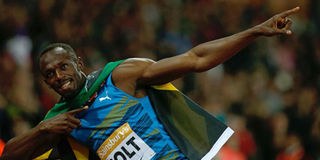Pressure on Usain Bolt to win where it all began

Jamaica's Usain Bolt creates his 'Lightening Bolt' pose as he celebrates winning the men's 100m Final during the IAAF Diamond League Anniversary Games athletics meeting at the Queen Elizabeth Olympic Park stadium in Stratford, west London on July 24, 2015. PHOTO | ADRIAN DENNIS |
What you need to know:
- Can the pressure ever have been higher on the Jamaican showman to perform?
- Farah will again face a tough challenge from the east African powerhouses of Ethiopia and Kenya, the latter having finished fourth in the medals table at the 2013 Moscow worlds behind winners Russia
BEIJING
Not for the first time, sprint king Usain Bolt — arguably world sport's most recognisable figure — is shouldered with the burden of not only racing against and beating proven doping cheats, but also bringing a much-needed ray of sunshine to the track.
Can the pressure ever have been higher on the Jamaican showman to perform? To go out and execute his race well enough to ensure gold, enabling him and the IAAF to snub their noses at the doping scourge that has cast a thick cloud over athletics ahead of the August 22-30 world championships.
And, as if track and field's governing body had penned the script itself, where better for Bolt to perform than at the very venue where he made his name.
"It's been a long time since I've seen you my friend. We will be meeting soon #Beijing2015," Bolt recently tweeted alongside a photo of the Chinese capital's iconic Bird's Nest Stadium.
It was there during the 2008 Beijing Olympics as a 21-year-old that Bolt kicked off his sparkling career, blasting to a memorable double gold in the 100 and 200m before anchoring the Jamaican 4x100m relay team to glory.
Since then, Bolt has gone on to win every Olympic and world sprint and relay title on offer, save the 100m in Daegu in 2011 when he was disqualified after a false start.
"In the period since I have been president, Usain Bolt's outstanding performances across many competitions stand out," outgoing IAAF president Lamine Diack gushed to AFP. "His fame has transcended athletics."
Sebastian Coe will succeed Diack following a vote by the IAAF's 214 member federations on Wednesday, and the victor will know they need a lot more than one stand-out, clean athlete to fight the doping problem the sport faces.
(READ: Coe elected IAAF chief)
For one, the sprinter most favoured to knock Bolt off his perch is Justin Gatlin, the American who finds himself in the form of his life at the age of 33 having served two doping bans, including one from 2006-10 after wrapping up the 2004 Olympic 100m title and the 2005 world sprint double.
And recent media revelations have also rocked athletics, the Sunday Times publishing a report earlier this month on a leaked database of 12,000 blood tests from 5,000 athletes that revealed "extraordinary" levels of doping.
HIT BACK
The IAAF hit back at those allegations describing them as "sensationalist and confusing" and rejected later claims it had supressed publication of research into elite athletes at the 2011 Daegu worlds that between 29 and 34 percent of the 1,800 competitors at the championships had violated anti-doping rules in the previous 12 months.
It has left a sour taste in the mouth ahead of what should be one of the most whetting of experiences for athletics fans.
"All athletes have the right to try and help the sport, to keep the sport in a good light. I think it's all our responsibility," Bolt said at the London Diamond League meet, his last outing before Beijing.
"I just do my best and try to run fast. I do it clean and I think that's what I have to continue doing. I'm not going to say I'm the only saviour of athletics, but I just try to do my best to stay focused on the goal I have."
Aside from Bolt, eyes on the track will focus on the Jamaican's close friend Mo Farah, the Briton who will be seeking a third consecutive world 10,000m title and second in the 5,000m, distances over which he is also reigning Olympic champion.
Farah has also found himself at the centre of a doping row amid allegations his coach Alberto Salazar administered testosterone to American distance runner Galen Rupp in 2002 when Rupp — a training partner of Farah — was only 16, and encouraged misuse of prescription drugs.
There is no suggestion however that Farah has violated anti-doping rules, although he came under pressure after it emerged he missed two drug tests in the lead-up to the London 2012 Olympics.
Farah will again face a tough challenge from the east African powerhouses of Ethiopia and Kenya, the latter having finished fourth in the medals table at the 2013 Moscow worlds behind winners Russia, second-placed the United States and Jamaica in third, while Ethiopia were sixth behind Germany.





